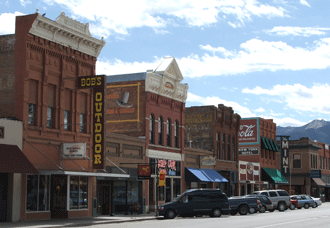 |
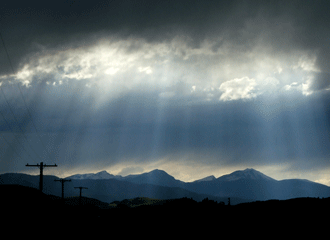 |
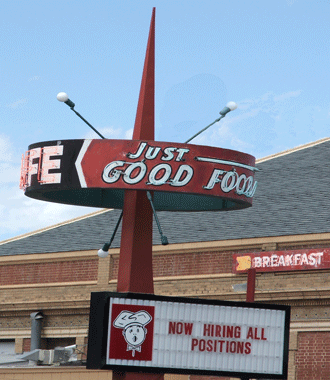 |
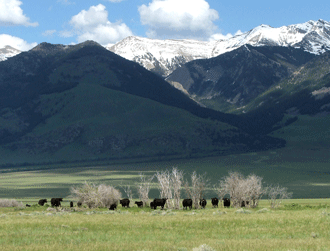 |
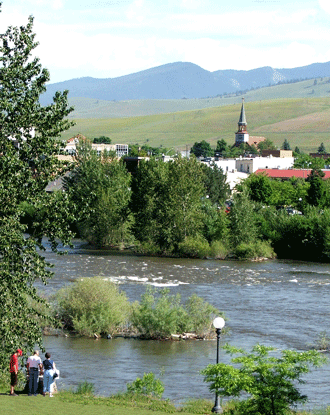 |
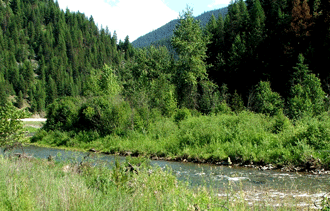 |
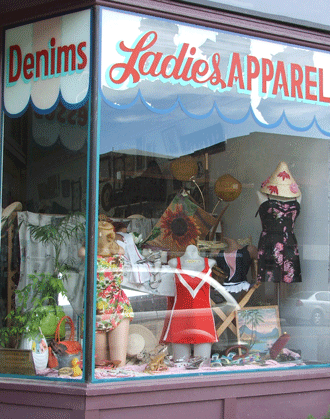 |
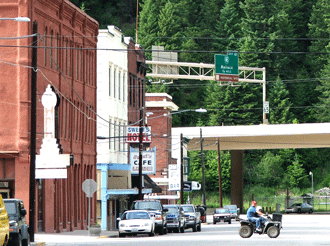 |
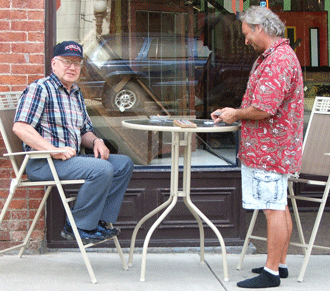 |
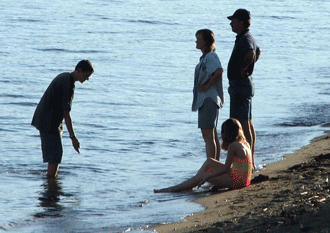 |
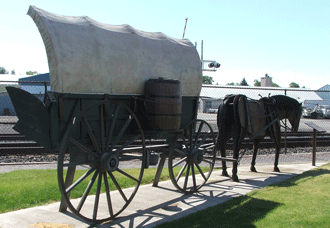 |
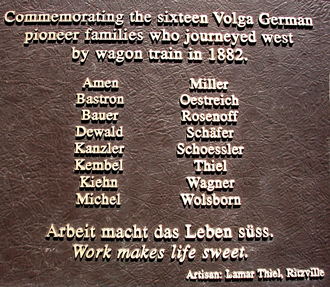 |
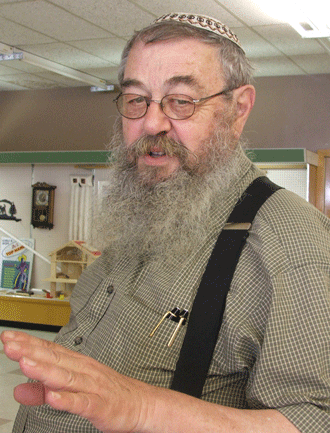 |
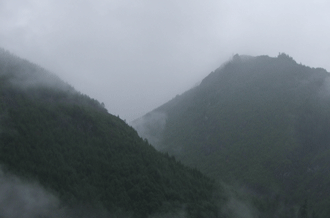 |
Tales of a 21st Century Gypsy
June 22, 2005 From Yellowstone to Tacoma.
David and I parted ways in Livingston, Montana on a Sunday morning, he to return to Boulder and I to head west to Tacoma. I had four days to get there, so I was in no hurry. A good thing, as I had to begin with a detour south to pick up the AC adaptor for my computer, which I had forgotten at a restaurant in West Yellowstone. Before that, though, I swung through Livingston to look at the town a bit better. The towns across the country are not all identical, but the similarities among them are striking. A few blocks now referred to as the “historic downtown,” with a main street, usually with that name. Buildings are one or two stories, and many have false facades that make them look a bit more imposing than they really are. Some have dates on them, usually from late 19th century. The bigger towns are county seats, and they have an imposing county courthouse, usually at the middle of a square that cars have to drive around to get through town. Livingston differed from the rest of the places I’ve seen in the absolutely staggering number of bars lining the main street. I wondered if its proximity to Yellowstone created a tourist clientele for all that alcohol – but the real tourist towns, like West Yellowstone, didn’t have that many bars. I asked a couple of women on the street about the bars, and they said that was just western Montana, bars are the place to go.
Aside from the historic downtowns, most of these towns could be strip development, anywhere USA. Near the highway exit there are the usual array of gas stations, perhaps full-fledged truck stops, and fast food places. As you go into town there are motels, car washes, mobile homes, hardware stores, used car lots, grocery stores and liquor shops. It’s all a bit dreary and run-down. Somewhere I suppose there are some ordinary scrubbed residential neighborhoods of single-family homes with tidy lawns, elementary schools with paper cut-outs taped inside the windows, and perhaps a park with playground equipment. These communities are rural America, I suppose. Too remote to be suburban anywhere, they are still stand-alone towns surrounded by agriculture. Maybe even too remote to drive to the nearest shopping mall or Walmart. To me the historic downtowns give them more character, but perhaps that’s because I don’t know what it’s like to live there. The locals know each other, they know what’s going on in town, they know where the good shops and restaurants are, their teen-agers work at the McDonald’s or the Dairy Queen, they know who goes to which church. So it has an identity that I never see driving through.
Western Montana is ranch country, with wide open, empty landscape. There are hardly any trees, so you see for miles, rolling green hills against a backdrop of snow-capped mountains, hazy blue skies, and mounds of billowing clouds. Around the occasional stream a cluster of trees springs up, and cattle cluster around them. When it rains, the light is dramatic, the sun’s rays shooting from behind the clouds, picking out details on the hills, while stretches of open space remain in the shade. There’s hardly any traffic, almost no houses, not even many cows watching as I pass on the road.
I stopped in Missoula, because I once met a nice woman who was an economics professor there, a friend of a friend. I even thought of looking her up before I got there, but I never got around to it. So instead I parked my van at the edge of town and headed out on my bike, along the river, through an old residential neighborhood, into the business district. I’d heard great things about Missoula, but my cursory investigation didn’t really bring them to light. I cruised through the University of Montana campus, but it didn’t strike me one way or the other. There is a river, and a bike/ped trail that follows it for a few miles. It’s a small town, though, not really a city – looking across the river towards the business district, you see the green hills and the mountains just past the buildings.
The next day was warm and I didn’t feel like driving, so I kept finding excuses to stop. As I was getting into the mountains, a stream paralleled the highway. I pulled off at the next exit to see what was there. Nothing, really, just the stream, and a dusty empty spot next to it where I pulled in. There must have been a town somewhere near that exit, but I didn’t even look for it. Instead I pulled off my shoes and waded into the stream. It was lovely and cold, icy at first but it felt great. I wandered up and down the stream a bit, over to a big log, thick enough that the top was dry and I could sit on it above the water. I thought about reading for a while, and figured if I was doing this, I might as well do it all the way. So I pulled on a bathing suit, grabbed my book and a towel, locked the van, and waded back to the log. I ended up staying there for hours, sitting in the stream, my back against the log, bracing myself against the rushing water and reading. Occasionally someone else would pull up and ask if the water wasn’t too cold to sit in, but I liked it. One couple came in with a pickup, and told me they were cutting some of the dead logs – she was a sculptor and was using the wood to make things. I heard them rustling around for quite a while, over the sound of the water. They stopped to say goodbye when they finally left. And eventually I figured that I had gotten quite enough sunburn, and it was time to keep moving. . So regretfully I dried off and got back on the interstate.
A little further down the road, well into the afternoon, I found the highway going down into a valley on an elevated roadway, a little town nestled beneath it, surrounded by steep mountain slopes. As I drove over the town I began to wonder about this place below the interstate, so I got off at the exit and drove into town to check it out. Wallace, Idaho, this was. It seemed an improbable place. The valley was so steep that the town really couldn’t expand, which I supposed was why the highway had been elevated over it. I was wrong, as it turned out. Two gray-haired men playing a board game at a table outside a shop invited me to photograph them, so I asked about the elevated highway. It turned out that someone in Wallace had connections, and when it was proposed to bring the highway through, he forced through the funding to elevate it, so it wouldn’t change the character of the town. The men told me, gleefully, that Wallace had the most expensive few miles of the entire interstate highway system.
I wandered around the town for a long time, looking in shop windows and taking pictures. Eventually I went into a jewelry store, which turned out to be the workshop of a man who had moved to Wallace three years earlier because he liked the place. He had worked in casinos for years, and was waiting to hear about a job in eastern Washington when he decided he was fed up with that life. So he moved to Wallace and set up as a silversmith, making jewelry that he sold in the summers to tourists like me. His grown kids were shocked when he made the move, but he liked living in this small quiet town wedged between the hills and the highway. He told me it was once known as a center of the sex trade, but all that remained of that industry was a brothel museum on the next street over. I bought a pair of earrings from him, and reluctantly headed back onto the road.
My next stop was Coeur d’Alene, Idaho, a place I’d heard of because I met a family from there twenty five years ago when I was traveling in Turkey. That was as good a reason as any to stop there, so once again I pulled off the highway, relieved to stop driving. Passing a laundromat on the way into town, I pulled over, dumped my clothes in a washer, and got on my bike to see what there was to see. Coeur d’Alene turns out to be bigger than I’d thought. It’s at the end of a lake – perhaps a reservoir? – lined with hotels and marinas, with powerboats and jet skis buzzing across the water. Crowds of people were swimming at public beaches and walking along a promenade between a park and the lake. I desperately wanted to go swimming, but I had to ride back to put my laundry in the dryer, so regretfully I headed back instead.
Driving into Washington the next morning, I was beginning to think about breakfast when I saw a sign for the town of Ritzville, and “next services 43 miles.” So I figured I’d better get off here, and I pulled into town. Eastern Washington is nothing like Idaho – the land is flat and brown, the sun bakes everything, and the world feels bright and dusty. I had breakfast in a restaurant in the center of town where, to my surprise, the waitress had short-cropped purple hair. She said it was good to surprise her customers a bit. I wandered through town after breakfast, seeing the usual – one and two story buildings on main street, a county courthouse, a shop selling quilting supplies, a Carnegie library. Someone in Ritzville was clearly interested in the town’s history, because there was a metal sculpture of Philip Ritz on one corner, and another of a horse pulling a covered wagon next to the renovated railroad station, both by the same artist. Next to the horse was a plaque commemorating “the sixteen Volga German families who journeyed west by wagon train in 1882” – and who presumably founded Ritzville. The Volga Germans were a group who went from Germany to the Volga River, and thence to the United States. The plaque then read “Artisan: Lamar Thiel, Ritzville.” Thiel was one of the sixteen names commemorated.
I was about to head on out of town when my eye was caught by the words above a shop selling miscellaneous junk – “Gallery – Antiques – books and gifts – Judaica.” Judaica? In this sleepy farm town in the middle of eastern Washington? I headed inside and was greeted by the owner, a stout man with a long gray beard and a yarmulke. He was not Jewish, as it turns out, but he was used to any Jews who came through town doing a double-take and walking into his store. We talked for hours. He turned out to be of a Christian sect that identifies with the Jews, and follows many Jewish practices, including observing the holidays and keeping Kosher, at least to some extent. He had been an economics professor at a community college in Tacoma for much his working life, but retired to Ritzville because the living was cheap and he was tired of the bustle of the city. The locals didn’t accept him, he said. He thought them anti-Semitic, and prejudiced because of his interest in the Jews. He also thought that those Volga Germans were probably originally Jews anyway, but in denial. In their sixties, he and his wife had recently adopted three children from Ukraine, a boy who is now fifteen and his twin sisters, about twelve. I was surprised to hear that – he wasn’t young to be taking on the challenge of three immigrant children. He explained that he’d spent his whole life taking care of children, his own, refugee children, all sorts of children. Someone he knew had met these three children on a visit overseas and asked him to provide them a home. So what else was he to do? His religion told him to take care of people in need, so he and his wife had opened his door to them. The boy, he said, was having some trouble adjusting to the United States, but the girls were wonderful and doing very well. As for him, he was afraid he would have to close his shop. He liked having it, it gave him a place to hang out and meet people and interact, but it didn’t make any money at all and he didn’t think he could keep paying the eighty-odd dollars a month in rent to keep it going. In the meantime, it drew in all kinds of interesting people who were passing through.
It was near lunchtime when I got back on the road. It was hot out, and my air conditioning didn’t seem to be working, and I wanted to go swimming. I came to a town called Moses Lake, and figured there had to be some way to get into the lake. But I drove around in circles and couldn’t find a beach or a lakefront park. Finally I asked someone sitting outside a bar. Naah, he said, no place to swim in the lake, but there’s the aquatic center down the road. The aquatic center turned out to be a vast public pool crammed with children, with one lane roped off for laps. I grabbed it, and swam for over an hour, remembering again just as I was finishing that I’d forgotten the sun screen. It was great to be in the water, though my van was like an oven by the time I got back in.
The interstate rose up a long hill as I made my way west. Matilda doesn’t do well on hills, so we kept to the right with the trucks, letting the cars and SUVs race past us. So it was easy to pull over when I saw a sign for a scenic overlook. I had gotten past the land of dry wheat fields and blowing soil, and into low, barren mountains. The overlook was above a reservoir, a sheet of open blue water with a single small boat speeding along far below, its wake a scratch of white chalk on the surface. The opposite hills were empty, not a house or a town or a road in sight. A few miles south I could make out a small marina down on the water, and further than that a bridge where the highway crossed the reservoir It was a beautiful and desolate place. I thought of spending the night there, but it was too isolated and didn’t feel safe.
The next morning I passed from the drylands into the rain forest. The mountains grew taller, and suddenly they were thick with lush forests, drifting in clouds of mist that changed into a steady rain as the morning went on. I’d finally made it to the Pacific Northwest, where people had been telling me for a year and a half I had to go. Not for long, though. I found my colleagues’ house in Tacoma, where Matilda was going to spend the next three weeks, and the next morning I left very early to catch a plane to Washington DC and then Malawi, where I was heading for some gainful employment.